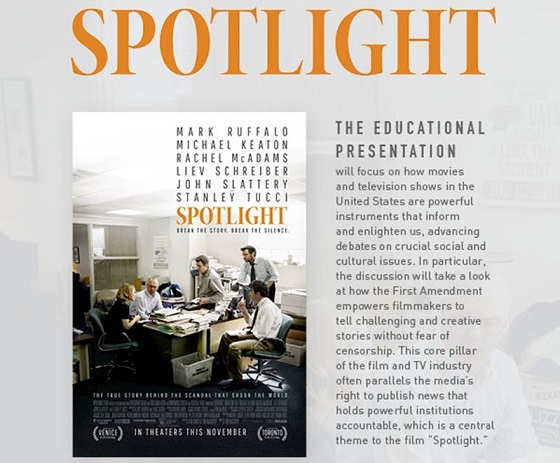"Spotlight" Nails It

The smarter way to stay on top of broadcasting and cable industry. Sign up below
You are now subscribed
Your newsletter sign-up was successful
"Spotlight" is the best movie about journalism since "All the President's Men." In fact, if there could be an unrelated sequel to that movie, it would be this one.
Go see it. Take your friends to see it. If you are a journalist, any kind of journalist, see it and you will stand just a little taller when you come out, perhaps remembering a story you wrote that made a difference. It doesn't have to be a big difference. Lots of little ones add up.
In honor of Free Speech Week (Oct. 19-25) (http://www.freespeechweek.org/), the Motion Picture Association of America held a preview screening of the movie, which chronicles the legwork that resulted in the Pulitzer Prize-winning series of stories in the Boston Globe about sexual abuse by Catholic priests, a story whose reverberations are still being felt a dozen years later.
I think it only mentions the First Amendment once--the paper takes the church to court over the release of documents--but at its heart it is all about the freedom that amendment gives journalists to tell truth to power, in this case an awful truth that the power already knew about and was trying to cover up.
The movie focuses entirely on the search, with not extraneous plot lines about relationships and back stories. The relationship is among journalists, their sources, the forces trying to kill the story, and the truth, which provides more than enough drama.
In introducing the movie at the screening in Washington, MPAA VP of legal affairs Ben Sheffner said: "One thing that journalism and motion pictures have in common is that both industries thrive in this country in large part because of our constitutional guarantee of free speech. And both industries have been at the forefront of the fight for free speech. Today it seems virtually unthinkable that the government could censor news reports or movies because it disapproves of their message. But it’s important to remember that this was not always the case."
The message in Spotlight is that the public needs a free press to stand up to powerful institutions, and news executives willing to go to the wall for an important story, even when it could alienate the readers who pay the bills.
The smarter way to stay on top of broadcasting and cable industry. Sign up below
It does not paint the journalists as heroes so much as people doing a difficult job well. And no one escapes scrutiny--the church, the legal system that shielded it, and the journalists who could possibly have prevented some of the abuses if they had been willing to connect the dots earlier and challenge the church.
The film captures the harshly fluorescent lit, cluttered-cubicle newsroom environment as expertly as All the President's Men, and the conversations between a reporter and his source even have the same feel and timbre as the Hall Holbrooke (Deep Throat) conversations from that movie. That is because both ring true.
My daughter, who came along to the screening, said afterward it was the kind of movie that made you want to be a journalist. It is also the kind of movie that makes you want to applaud when the credits roll.
Contributing editor John Eggerton has been an editor and/or writer on media regulation, legislation and policy for over four decades, including covering the FCC, FTC, Congress, the major media trade associations, and the federal courts. In addition to Multichannel News and Broadcasting + Cable, his work has appeared in Radio World, TV Technology, TV Fax, This Week in Consumer Electronics, Variety and the Encyclopedia Britannica.

